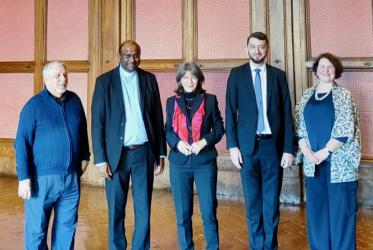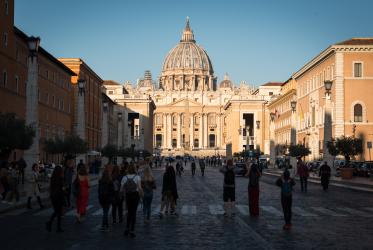An international ecumenical study meeting on xenophobia and populism took place in Rome from 13-15 December. The gathering was jointly hosted by the World Council of Churches (WCC) and the Dicastery for Promoting Integral Human Development in collaboration with the Pontifical Council for Promoting Christian Unity. Among its goals was the planning of a world conference on these issues, to be held from 22 to 23 May next year.
In this week’s meeting, participants nurtured an informed dialogue that will shape future joint endeavors. “The conference articulated a deeper understanding of xenophobia and the corresponding rise in populism, particularly in the context of the global migration and refugee crisis,” said WCC general secretary Rev. Dr Olav Fykse Tveit, who added that the convening group was mindful of the complex nature of the issues.
Many faith-based organizations as well as state and civil society groups are committed to engaging in an open dialogue about difficult questions with those of differing viewpoints, seeking to respond cohesively to xenophobia and populism, Tveit added.
Tveit said it’s vital to understand the many reasons for migration, including those fleeing from wars, and to avoid making migrants “scapegoats for everything that creates the problems of the world today”.
Tveit said it’s important to develop a realistic message that takes into account people’s fears, but that also draws on Christian values to encourage a change in people’s behaviours, approaches, attitudes.
“With this meeting, we intend to seek realistic accounts of the migration experience and the impact on host societies, including the interrogation of associated narratives of fear and underlying psychological, socio-cultural, political, and economic factors,” said Tveit.
Tveit concluded: “The planned world conference next May, will work on deepening this analysis and learning from each other’s experiences, but also create a strategy for sharing this message by forging relationships with all people of good will.”
He added “As churches, we know the problems of those who have to find a new home”, as well as “the challenges for those who receive them, but we know also a lot about the capacities of human beings to find new ways of living together, and the values that can inspire us to do so”.
Cardinal Peter Turkson, prefect of the Vatican Dicastery for Promoting Integral Human Development, said Christians are called to guide humanity towards universal brotherhood.
“An effect of the phenomenon of migration we are witnessing today is rejection, resistance, non-acceptance of those who do not belong to a community,” he said. “This feeling takes different forms. Sometimes it is mainly expressed through xenophobia, other times it generates populism.”
Xenophobia, understood as the fear of people from other countries, also takes the shape of racial hatred, Turkson added. “This form of rejection has recently escalated,” he said. “Sometimes fear is expressed also against religion.”
Peter Colwell, deputy general secretary of Churches Together in Britain and Ireland (CTBI), recalled a consultation last year, held in partnership with the WCC, on the relationship between migration and inter-religious relations, and CTBI is looking towards further work to be undertaken in the UK and Ireland context.
“What is clear is that history, memory and narrative are important, and that a narrative of inter-religious ‘othering’ returns – the political right claiming an ownership of Christian identity with Muslims seen to be the primary other to white, english, far right nationalism,” he said.
Media contacts:
Please contact WCC director of communication Marianne Ejdersten: [email protected], +41 79 507 63 63
Vatican Radio, 15 December 2017




